Integrated Reporting: Framework, Strategy, and Capital Analysis
VerifiedAdded on 2023/04/25
|8
|2036
|436
Report
AI Summary
This report provides a comprehensive analysis of integrated reporting (IR), exploring its relevance in contemporary corporate environments. It examines the IR framework, emphasizing its role in projecting both financial and non-financial performance to stakeholders, including environmental, social, and governance (ESG) aspects. The report discusses the importance of IR for enhancing brand value, customer loyalty, and long-term sustainability. It highlights the relevance of IR in the modern corporate landscape, addressing the limitations of traditional annual reports and the need for a holistic approach. The study further explores the influence of IR on corporate strategy and control, the adoption of IR by various private and public sector entities, and the impact of the six capitals on strategic management accounting. It also covers the role of IR in investor relations and risk disclosure. The report concludes by summarizing the key findings and reiterating the significance of IR for creating sustainable value and informing stakeholders.
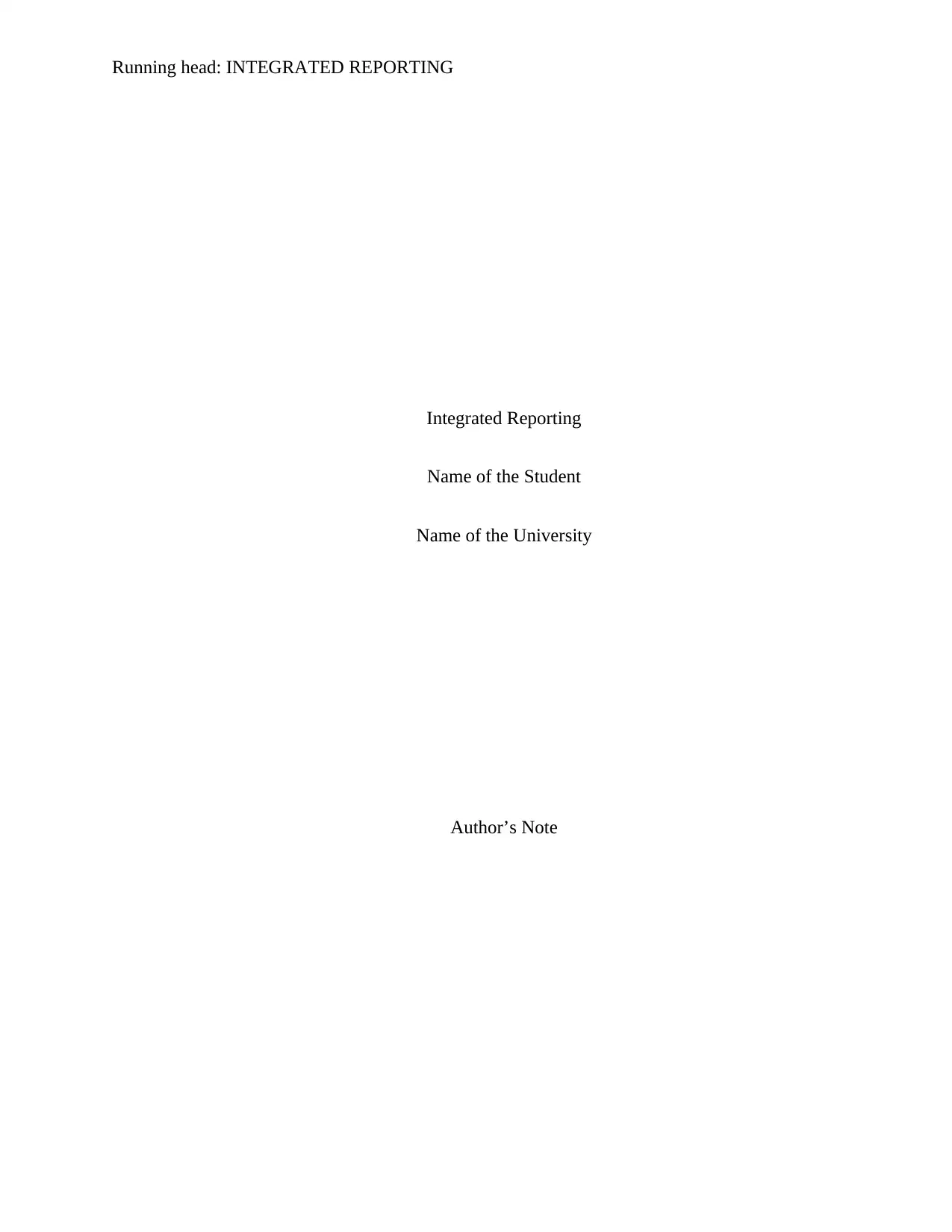
Running head: INTEGRATED REPORTING
Integrated Reporting
Name of the Student
Name of the University
Author’s Note
Integrated Reporting
Name of the Student
Name of the University
Author’s Note
Paraphrase This Document
Need a fresh take? Get an instant paraphrase of this document with our AI Paraphraser
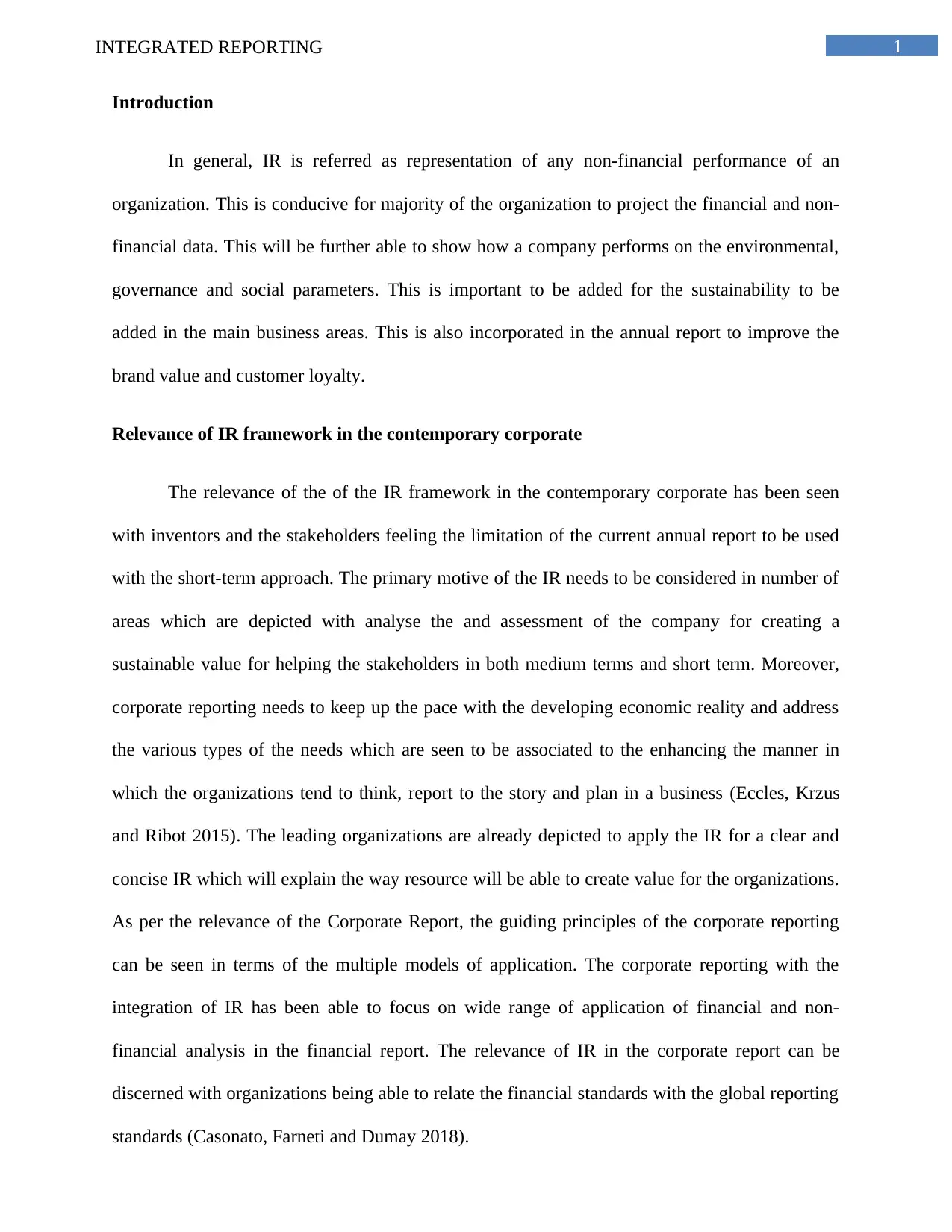
1INTEGRATED REPORTING
Introduction
In general, IR is referred as representation of any non-financial performance of an
organization. This is conducive for majority of the organization to project the financial and non-
financial data. This will be further able to show how a company performs on the environmental,
governance and social parameters. This is important to be added for the sustainability to be
added in the main business areas. This is also incorporated in the annual report to improve the
brand value and customer loyalty.
Relevance of IR framework in the contemporary corporate
The relevance of the of the IR framework in the contemporary corporate has been seen
with inventors and the stakeholders feeling the limitation of the current annual report to be used
with the short-term approach. The primary motive of the IR needs to be considered in number of
areas which are depicted with analyse the and assessment of the company for creating a
sustainable value for helping the stakeholders in both medium terms and short term. Moreover,
corporate reporting needs to keep up the pace with the developing economic reality and address
the various types of the needs which are seen to be associated to the enhancing the manner in
which the organizations tend to think, report to the story and plan in a business (Eccles, Krzus
and Ribot 2015). The leading organizations are already depicted to apply the IR for a clear and
concise IR which will explain the way resource will be able to create value for the organizations.
As per the relevance of the Corporate Report, the guiding principles of the corporate reporting
can be seen in terms of the multiple models of application. The corporate reporting with the
integration of IR has been able to focus on wide range of application of financial and non-
financial analysis in the financial report. The relevance of IR in the corporate report can be
discerned with organizations being able to relate the financial standards with the global reporting
standards (Casonato, Farneti and Dumay 2018).
Introduction
In general, IR is referred as representation of any non-financial performance of an
organization. This is conducive for majority of the organization to project the financial and non-
financial data. This will be further able to show how a company performs on the environmental,
governance and social parameters. This is important to be added for the sustainability to be
added in the main business areas. This is also incorporated in the annual report to improve the
brand value and customer loyalty.
Relevance of IR framework in the contemporary corporate
The relevance of the of the IR framework in the contemporary corporate has been seen
with inventors and the stakeholders feeling the limitation of the current annual report to be used
with the short-term approach. The primary motive of the IR needs to be considered in number of
areas which are depicted with analyse the and assessment of the company for creating a
sustainable value for helping the stakeholders in both medium terms and short term. Moreover,
corporate reporting needs to keep up the pace with the developing economic reality and address
the various types of the needs which are seen to be associated to the enhancing the manner in
which the organizations tend to think, report to the story and plan in a business (Eccles, Krzus
and Ribot 2015). The leading organizations are already depicted to apply the IR for a clear and
concise IR which will explain the way resource will be able to create value for the organizations.
As per the relevance of the Corporate Report, the guiding principles of the corporate reporting
can be seen in terms of the multiple models of application. The corporate reporting with the
integration of IR has been able to focus on wide range of application of financial and non-
financial analysis in the financial report. The relevance of IR in the corporate report can be
discerned with organizations being able to relate the financial standards with the global reporting
standards (Casonato, Farneti and Dumay 2018).
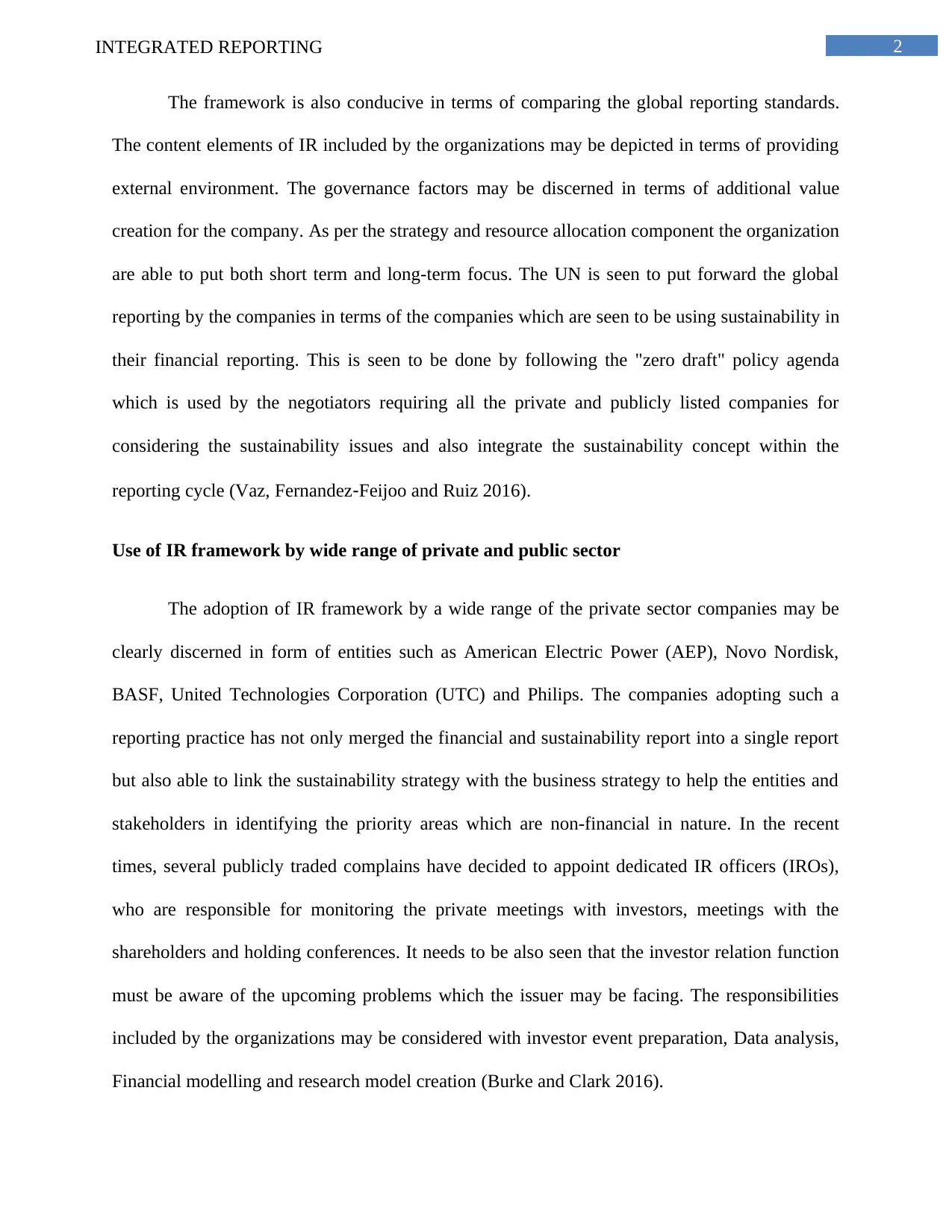
2INTEGRATED REPORTING
The framework is also conducive in terms of comparing the global reporting standards.
The content elements of IR included by the organizations may be depicted in terms of providing
external environment. The governance factors may be discerned in terms of additional value
creation for the company. As per the strategy and resource allocation component the organization
are able to put both short term and long-term focus. The UN is seen to put forward the global
reporting by the companies in terms of the companies which are seen to be using sustainability in
their financial reporting. This is seen to be done by following the "zero draft" policy agenda
which is used by the negotiators requiring all the private and publicly listed companies for
considering the sustainability issues and also integrate the sustainability concept within the
reporting cycle (Vaz, Fernandez‐Feijoo and Ruiz 2016).
Use of IR framework by wide range of private and public sector
The adoption of IR framework by a wide range of the private sector companies may be
clearly discerned in form of entities such as American Electric Power (AEP), Novo Nordisk,
BASF, United Technologies Corporation (UTC) and Philips. The companies adopting such a
reporting practice has not only merged the financial and sustainability report into a single report
but also able to link the sustainability strategy with the business strategy to help the entities and
stakeholders in identifying the priority areas which are non-financial in nature. In the recent
times, several publicly traded complains have decided to appoint dedicated IR officers (IROs),
who are responsible for monitoring the private meetings with investors, meetings with the
shareholders and holding conferences. It needs to be also seen that the investor relation function
must be aware of the upcoming problems which the issuer may be facing. The responsibilities
included by the organizations may be considered with investor event preparation, Data analysis,
Financial modelling and research model creation (Burke and Clark 2016).
The framework is also conducive in terms of comparing the global reporting standards.
The content elements of IR included by the organizations may be depicted in terms of providing
external environment. The governance factors may be discerned in terms of additional value
creation for the company. As per the strategy and resource allocation component the organization
are able to put both short term and long-term focus. The UN is seen to put forward the global
reporting by the companies in terms of the companies which are seen to be using sustainability in
their financial reporting. This is seen to be done by following the "zero draft" policy agenda
which is used by the negotiators requiring all the private and publicly listed companies for
considering the sustainability issues and also integrate the sustainability concept within the
reporting cycle (Vaz, Fernandez‐Feijoo and Ruiz 2016).
Use of IR framework by wide range of private and public sector
The adoption of IR framework by a wide range of the private sector companies may be
clearly discerned in form of entities such as American Electric Power (AEP), Novo Nordisk,
BASF, United Technologies Corporation (UTC) and Philips. The companies adopting such a
reporting practice has not only merged the financial and sustainability report into a single report
but also able to link the sustainability strategy with the business strategy to help the entities and
stakeholders in identifying the priority areas which are non-financial in nature. In the recent
times, several publicly traded complains have decided to appoint dedicated IR officers (IROs),
who are responsible for monitoring the private meetings with investors, meetings with the
shareholders and holding conferences. It needs to be also seen that the investor relation function
must be aware of the upcoming problems which the issuer may be facing. The responsibilities
included by the organizations may be considered with investor event preparation, Data analysis,
Financial modelling and research model creation (Burke and Clark 2016).
⊘ This is a preview!⊘
Do you want full access?
Subscribe today to unlock all pages.

Trusted by 1+ million students worldwide
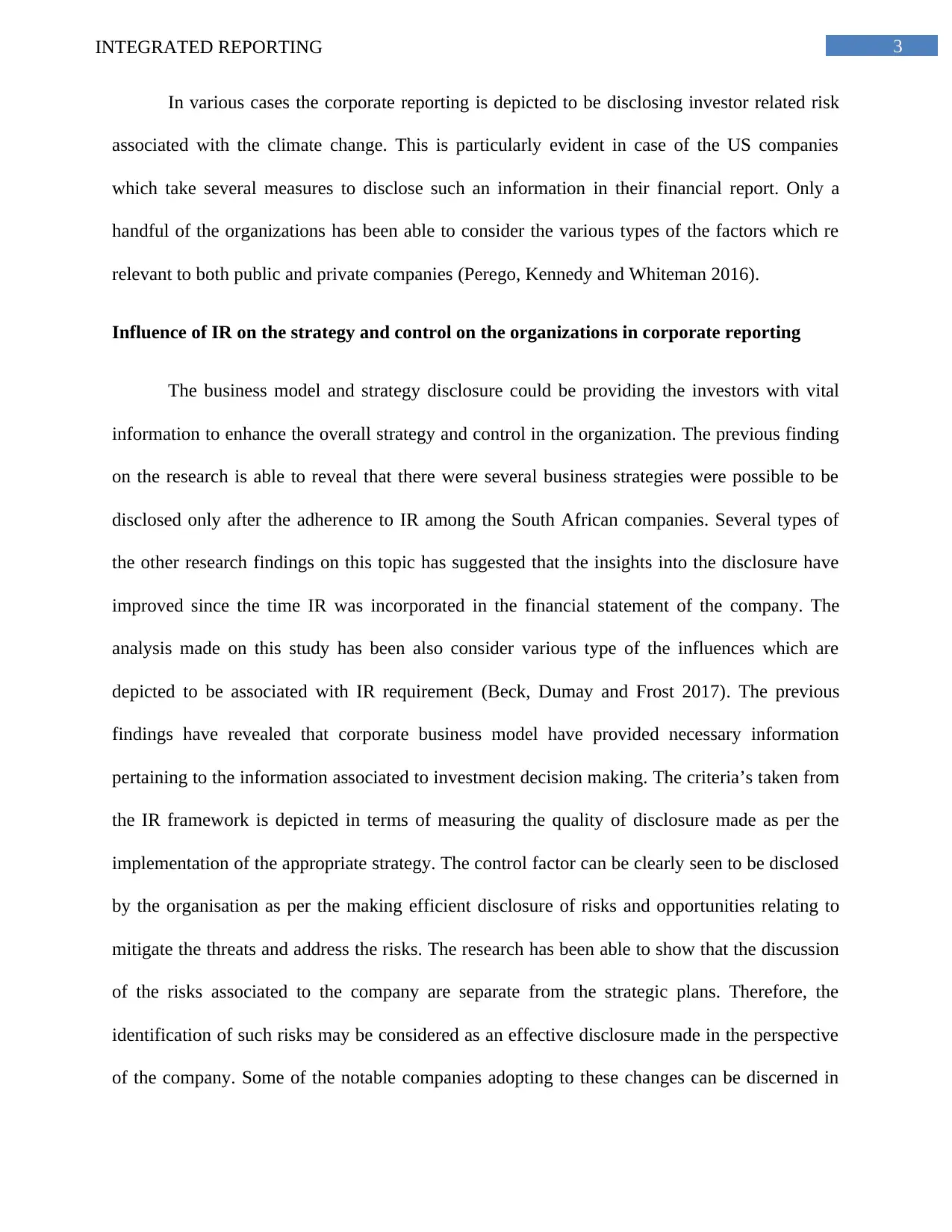
3INTEGRATED REPORTING
In various cases the corporate reporting is depicted to be disclosing investor related risk
associated with the climate change. This is particularly evident in case of the US companies
which take several measures to disclose such an information in their financial report. Only a
handful of the organizations has been able to consider the various types of the factors which re
relevant to both public and private companies (Perego, Kennedy and Whiteman 2016).
Influence of IR on the strategy and control on the organizations in corporate reporting
The business model and strategy disclosure could be providing the investors with vital
information to enhance the overall strategy and control in the organization. The previous finding
on the research is able to reveal that there were several business strategies were possible to be
disclosed only after the adherence to IR among the South African companies. Several types of
the other research findings on this topic has suggested that the insights into the disclosure have
improved since the time IR was incorporated in the financial statement of the company. The
analysis made on this study has been also consider various type of the influences which are
depicted to be associated with IR requirement (Beck, Dumay and Frost 2017). The previous
findings have revealed that corporate business model have provided necessary information
pertaining to the information associated to investment decision making. The criteria’s taken from
the IR framework is depicted in terms of measuring the quality of disclosure made as per the
implementation of the appropriate strategy. The control factor can be clearly seen to be disclosed
by the organisation as per the making efficient disclosure of risks and opportunities relating to
mitigate the threats and address the risks. The research has been able to show that the discussion
of the risks associated to the company are separate from the strategic plans. Therefore, the
identification of such risks may be considered as an effective disclosure made in the perspective
of the company. Some of the notable companies adopting to these changes can be discerned in
In various cases the corporate reporting is depicted to be disclosing investor related risk
associated with the climate change. This is particularly evident in case of the US companies
which take several measures to disclose such an information in their financial report. Only a
handful of the organizations has been able to consider the various types of the factors which re
relevant to both public and private companies (Perego, Kennedy and Whiteman 2016).
Influence of IR on the strategy and control on the organizations in corporate reporting
The business model and strategy disclosure could be providing the investors with vital
information to enhance the overall strategy and control in the organization. The previous finding
on the research is able to reveal that there were several business strategies were possible to be
disclosed only after the adherence to IR among the South African companies. Several types of
the other research findings on this topic has suggested that the insights into the disclosure have
improved since the time IR was incorporated in the financial statement of the company. The
analysis made on this study has been also consider various type of the influences which are
depicted to be associated with IR requirement (Beck, Dumay and Frost 2017). The previous
findings have revealed that corporate business model have provided necessary information
pertaining to the information associated to investment decision making. The criteria’s taken from
the IR framework is depicted in terms of measuring the quality of disclosure made as per the
implementation of the appropriate strategy. The control factor can be clearly seen to be disclosed
by the organisation as per the making efficient disclosure of risks and opportunities relating to
mitigate the threats and address the risks. The research has been able to show that the discussion
of the risks associated to the company are separate from the strategic plans. Therefore, the
identification of such risks may be considered as an effective disclosure made in the perspective
of the company. Some of the notable companies adopting to these changes can be discerned in
Paraphrase This Document
Need a fresh take? Get an instant paraphrase of this document with our AI Paraphraser
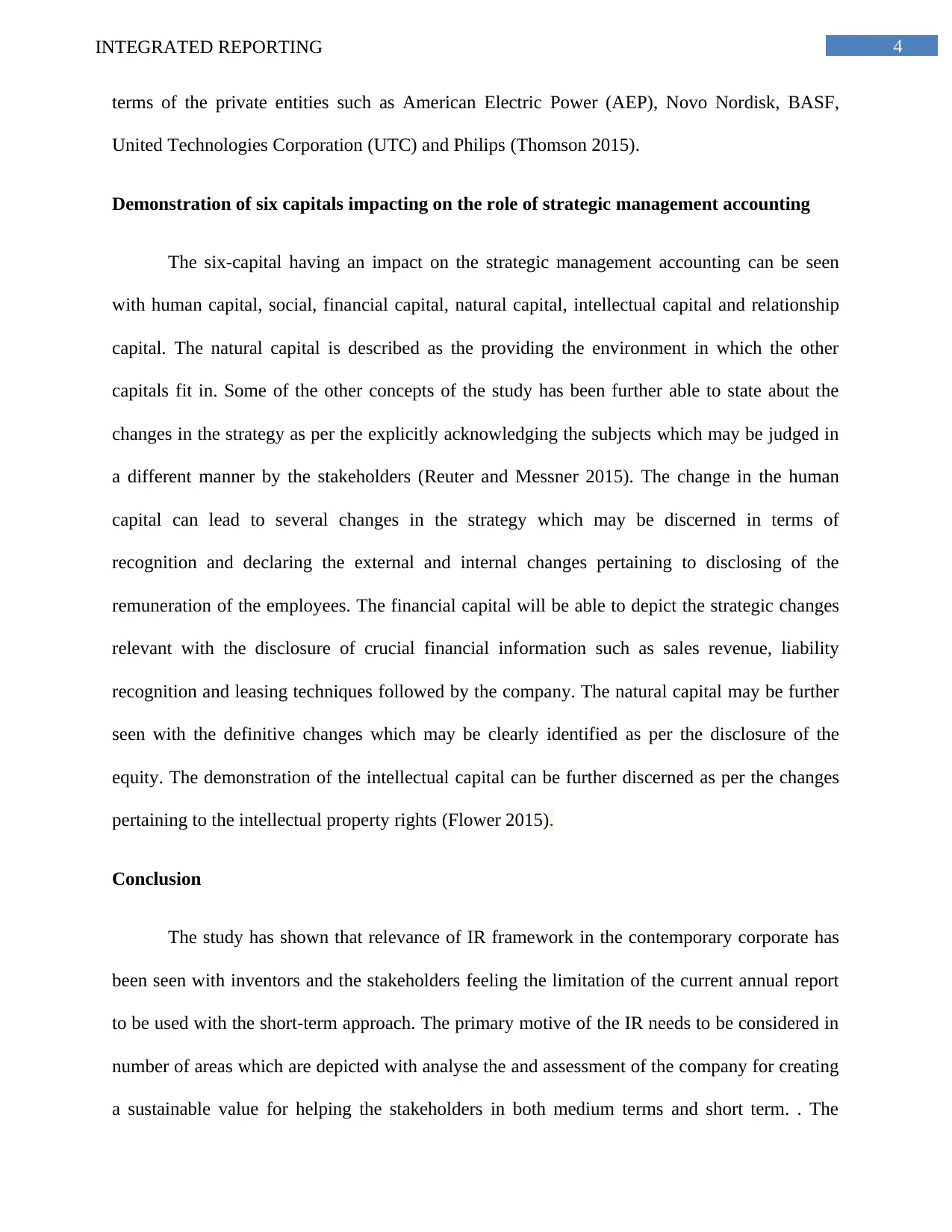
4INTEGRATED REPORTING
terms of the private entities such as American Electric Power (AEP), Novo Nordisk, BASF,
United Technologies Corporation (UTC) and Philips (Thomson 2015).
Demonstration of six capitals impacting on the role of strategic management accounting
The six-capital having an impact on the strategic management accounting can be seen
with human capital, social, financial capital, natural capital, intellectual capital and relationship
capital. The natural capital is described as the providing the environment in which the other
capitals fit in. Some of the other concepts of the study has been further able to state about the
changes in the strategy as per the explicitly acknowledging the subjects which may be judged in
a different manner by the stakeholders (Reuter and Messner 2015). The change in the human
capital can lead to several changes in the strategy which may be discerned in terms of
recognition and declaring the external and internal changes pertaining to disclosing of the
remuneration of the employees. The financial capital will be able to depict the strategic changes
relevant with the disclosure of crucial financial information such as sales revenue, liability
recognition and leasing techniques followed by the company. The natural capital may be further
seen with the definitive changes which may be clearly identified as per the disclosure of the
equity. The demonstration of the intellectual capital can be further discerned as per the changes
pertaining to the intellectual property rights (Flower 2015).
Conclusion
The study has shown that relevance of IR framework in the contemporary corporate has
been seen with inventors and the stakeholders feeling the limitation of the current annual report
to be used with the short-term approach. The primary motive of the IR needs to be considered in
number of areas which are depicted with analyse the and assessment of the company for creating
a sustainable value for helping the stakeholders in both medium terms and short term. . The
terms of the private entities such as American Electric Power (AEP), Novo Nordisk, BASF,
United Technologies Corporation (UTC) and Philips (Thomson 2015).
Demonstration of six capitals impacting on the role of strategic management accounting
The six-capital having an impact on the strategic management accounting can be seen
with human capital, social, financial capital, natural capital, intellectual capital and relationship
capital. The natural capital is described as the providing the environment in which the other
capitals fit in. Some of the other concepts of the study has been further able to state about the
changes in the strategy as per the explicitly acknowledging the subjects which may be judged in
a different manner by the stakeholders (Reuter and Messner 2015). The change in the human
capital can lead to several changes in the strategy which may be discerned in terms of
recognition and declaring the external and internal changes pertaining to disclosing of the
remuneration of the employees. The financial capital will be able to depict the strategic changes
relevant with the disclosure of crucial financial information such as sales revenue, liability
recognition and leasing techniques followed by the company. The natural capital may be further
seen with the definitive changes which may be clearly identified as per the disclosure of the
equity. The demonstration of the intellectual capital can be further discerned as per the changes
pertaining to the intellectual property rights (Flower 2015).
Conclusion
The study has shown that relevance of IR framework in the contemporary corporate has
been seen with inventors and the stakeholders feeling the limitation of the current annual report
to be used with the short-term approach. The primary motive of the IR needs to be considered in
number of areas which are depicted with analyse the and assessment of the company for creating
a sustainable value for helping the stakeholders in both medium terms and short term. . The
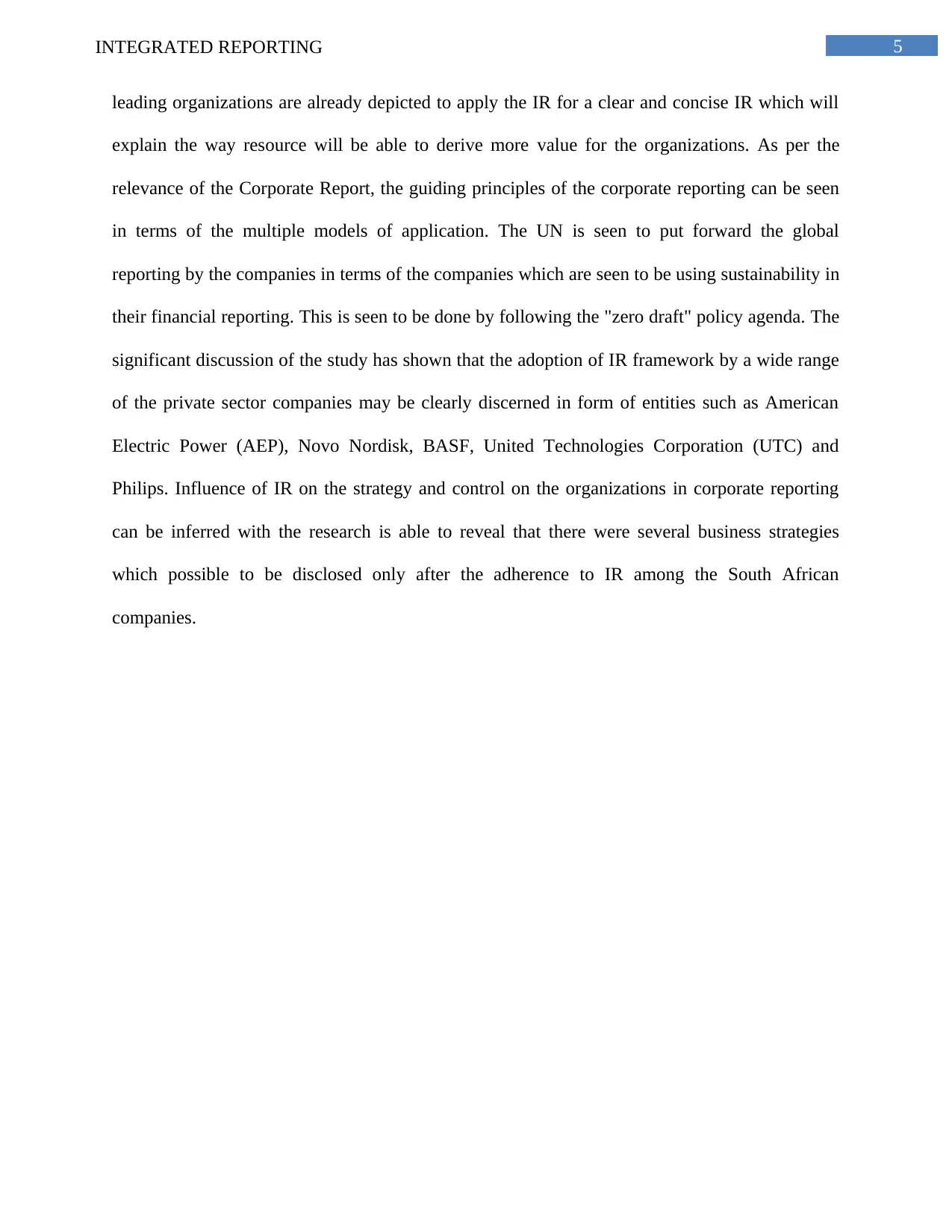
5INTEGRATED REPORTING
leading organizations are already depicted to apply the IR for a clear and concise IR which will
explain the way resource will be able to derive more value for the organizations. As per the
relevance of the Corporate Report, the guiding principles of the corporate reporting can be seen
in terms of the multiple models of application. The UN is seen to put forward the global
reporting by the companies in terms of the companies which are seen to be using sustainability in
their financial reporting. This is seen to be done by following the "zero draft" policy agenda. The
significant discussion of the study has shown that the adoption of IR framework by a wide range
of the private sector companies may be clearly discerned in form of entities such as American
Electric Power (AEP), Novo Nordisk, BASF, United Technologies Corporation (UTC) and
Philips. Influence of IR on the strategy and control on the organizations in corporate reporting
can be inferred with the research is able to reveal that there were several business strategies
which possible to be disclosed only after the adherence to IR among the South African
companies.
leading organizations are already depicted to apply the IR for a clear and concise IR which will
explain the way resource will be able to derive more value for the organizations. As per the
relevance of the Corporate Report, the guiding principles of the corporate reporting can be seen
in terms of the multiple models of application. The UN is seen to put forward the global
reporting by the companies in terms of the companies which are seen to be using sustainability in
their financial reporting. This is seen to be done by following the "zero draft" policy agenda. The
significant discussion of the study has shown that the adoption of IR framework by a wide range
of the private sector companies may be clearly discerned in form of entities such as American
Electric Power (AEP), Novo Nordisk, BASF, United Technologies Corporation (UTC) and
Philips. Influence of IR on the strategy and control on the organizations in corporate reporting
can be inferred with the research is able to reveal that there were several business strategies
which possible to be disclosed only after the adherence to IR among the South African
companies.
⊘ This is a preview!⊘
Do you want full access?
Subscribe today to unlock all pages.

Trusted by 1+ million students worldwide
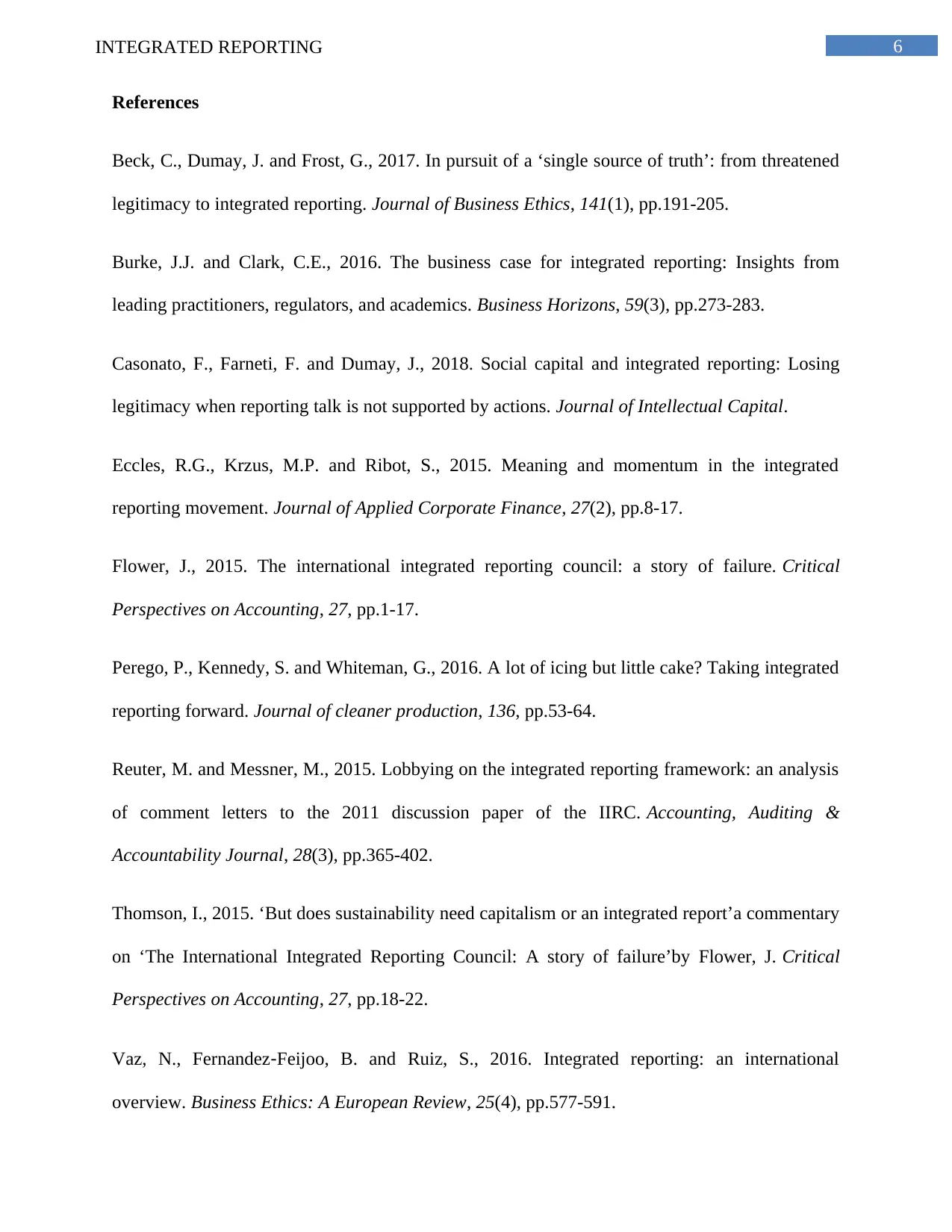
6INTEGRATED REPORTING
References
Beck, C., Dumay, J. and Frost, G., 2017. In pursuit of a ‘single source of truth’: from threatened
legitimacy to integrated reporting. Journal of Business Ethics, 141(1), pp.191-205.
Burke, J.J. and Clark, C.E., 2016. The business case for integrated reporting: Insights from
leading practitioners, regulators, and academics. Business Horizons, 59(3), pp.273-283.
Casonato, F., Farneti, F. and Dumay, J., 2018. Social capital and integrated reporting: Losing
legitimacy when reporting talk is not supported by actions. Journal of Intellectual Capital.
Eccles, R.G., Krzus, M.P. and Ribot, S., 2015. Meaning and momentum in the integrated
reporting movement. Journal of Applied Corporate Finance, 27(2), pp.8-17.
Flower, J., 2015. The international integrated reporting council: a story of failure. Critical
Perspectives on Accounting, 27, pp.1-17.
Perego, P., Kennedy, S. and Whiteman, G., 2016. A lot of icing but little cake? Taking integrated
reporting forward. Journal of cleaner production, 136, pp.53-64.
Reuter, M. and Messner, M., 2015. Lobbying on the integrated reporting framework: an analysis
of comment letters to the 2011 discussion paper of the IIRC. Accounting, Auditing &
Accountability Journal, 28(3), pp.365-402.
Thomson, I., 2015. ‘But does sustainability need capitalism or an integrated report’a commentary
on ‘The International Integrated Reporting Council: A story of failure’by Flower, J. Critical
Perspectives on Accounting, 27, pp.18-22.
Vaz, N., Fernandez‐Feijoo, B. and Ruiz, S., 2016. Integrated reporting: an international
overview. Business Ethics: A European Review, 25(4), pp.577-591.
References
Beck, C., Dumay, J. and Frost, G., 2017. In pursuit of a ‘single source of truth’: from threatened
legitimacy to integrated reporting. Journal of Business Ethics, 141(1), pp.191-205.
Burke, J.J. and Clark, C.E., 2016. The business case for integrated reporting: Insights from
leading practitioners, regulators, and academics. Business Horizons, 59(3), pp.273-283.
Casonato, F., Farneti, F. and Dumay, J., 2018. Social capital and integrated reporting: Losing
legitimacy when reporting talk is not supported by actions. Journal of Intellectual Capital.
Eccles, R.G., Krzus, M.P. and Ribot, S., 2015. Meaning and momentum in the integrated
reporting movement. Journal of Applied Corporate Finance, 27(2), pp.8-17.
Flower, J., 2015. The international integrated reporting council: a story of failure. Critical
Perspectives on Accounting, 27, pp.1-17.
Perego, P., Kennedy, S. and Whiteman, G., 2016. A lot of icing but little cake? Taking integrated
reporting forward. Journal of cleaner production, 136, pp.53-64.
Reuter, M. and Messner, M., 2015. Lobbying on the integrated reporting framework: an analysis
of comment letters to the 2011 discussion paper of the IIRC. Accounting, Auditing &
Accountability Journal, 28(3), pp.365-402.
Thomson, I., 2015. ‘But does sustainability need capitalism or an integrated report’a commentary
on ‘The International Integrated Reporting Council: A story of failure’by Flower, J. Critical
Perspectives on Accounting, 27, pp.18-22.
Vaz, N., Fernandez‐Feijoo, B. and Ruiz, S., 2016. Integrated reporting: an international
overview. Business Ethics: A European Review, 25(4), pp.577-591.
Paraphrase This Document
Need a fresh take? Get an instant paraphrase of this document with our AI Paraphraser

7INTEGRATED REPORTING
Zhou, S., Simnett, R. and Green, W., 2017. Does integrated reporting matter to the capital
market?. Abacus, 53(1), pp.94-132.
Zhou, S., Simnett, R. and Green, W., 2017. Does integrated reporting matter to the capital
market?. Abacus, 53(1), pp.94-132.
1 out of 8
Related Documents
Your All-in-One AI-Powered Toolkit for Academic Success.
+13062052269
info@desklib.com
Available 24*7 on WhatsApp / Email
![[object Object]](/_next/static/media/star-bottom.7253800d.svg)
Unlock your academic potential
Copyright © 2020–2025 A2Z Services. All Rights Reserved. Developed and managed by ZUCOL.





